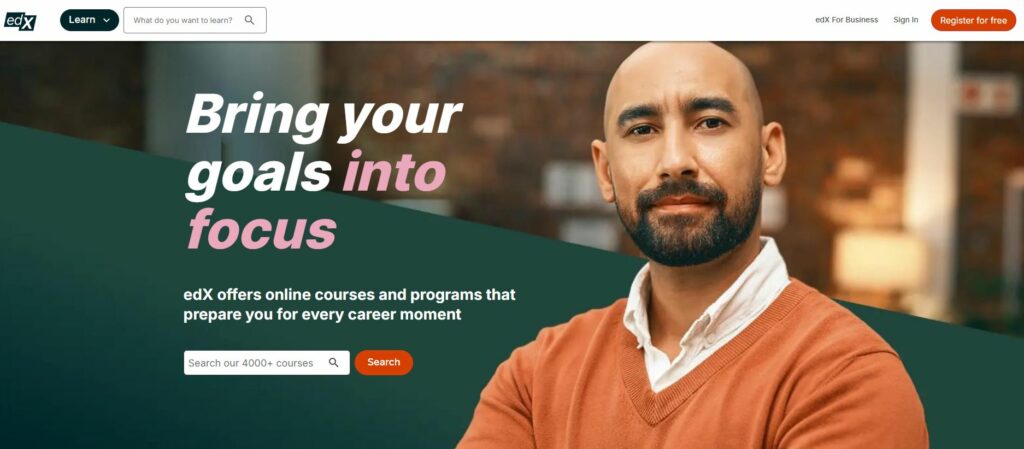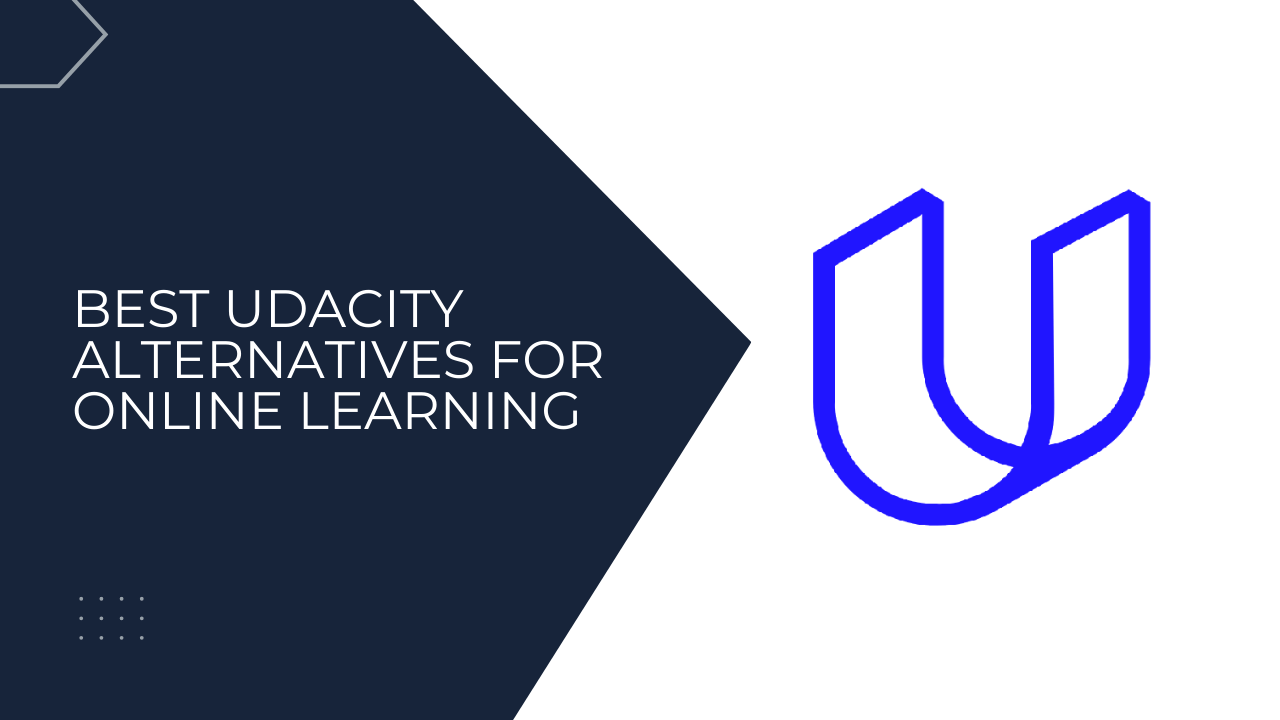Are you looking to upskill or pivot to a new career but unsure where to start? With countless online learning platforms available, it can be tough to figure out which one offers the best bang for your buck.
Udacity has long been a favorite for those seeking career-focused, tech-heavy courses, but it’s not the only game in town.
Whether you’re an aspiring data scientist, a coding enthusiast, or someone curious about learning something new, this guide breaks down the 7 best alternatives to Udacity to help you make an informed choice.
Here’s a deep dive into platforms that match or even surpass Udacity in delivering quality content, industry recognition, and career impact.
1. Coursera

Coursera is one of the most recognized names in online education, offering a massive library of courses, specializations, and degree programs in collaboration with top universities like Stanford, Yale, and industry giants like Google and IBM.
Coursera is designed for learners at every level, whether you’re just starting out or looking to earn advanced credentials. With flexible options like self-paced courses, guided projects, and structured programs with deadlines, it fits a variety of learning styles.
It also offers career-focused content in fields like technology, business, health, and social sciences, making it a top choice for both personal and professional growth.
Its certifications are widely respected and can enhance your resume or LinkedIn profile.
Pros
- Broad selection of programs, including specializations, professional certificates, and even full degrees in sought-after fields like data science, AI, and business.
- Courses are led by experienced professors and industry professionals, ensuring high-quality content.
- Flexible financial aid and scholarship options make learning more accessible for many.
Cons
- Full degree programs and some specializations can be pricey for budget-conscious learners.
- The quality of courses can vary depending on the instructor or institution.
- Some courses lean more toward academic theory rather than practical, job-ready skills.
2. edX

edX is a non-profit online learning platform founded by Harvard and MIT, renowned for its exceptional academic pedigree.
It collaborates with world-class universities and industry leaders to deliver diverse high-quality courses and programs. Whether you’re looking to explore technical topics, advance your career, or earn academic credits, edX offers options tailored to your goals.
Its MicroMasters and MicroBachelors programs stand out as bridges between online learning and formal education, making it a favorite for learners aiming to integrate online courses into traditional academic pathways.
Pros
- A wide selection of technical and academic courses has been developed by top universities and respected organizations.
- Strong focus on academic rigor and in-depth, structured learning.
- MicroMasters and MicroBachelors programs offer a pathway to earning college credit and advancing toward formal degrees.
Cons
- Course structures may feel rigid for those who prefer self-paced learning.
- Limited flexibility compared to platforms offering entirely self-directed study.
- Some courses may not emphasize the most current or in-demand industry skills.
3. Pluralsight

Pluralsight is a leading platform for IT professionals and software developers seeking to enhance their technical expertise and stay competitive in the ever-evolving tech landscape.
Pluralsight offers a vast library of courses, skill assessments, and personalized learning paths to help you master in-demand technologies like cloud computing, cybersecurity, software development, and data analysis.
It’s an excellent resource for those aiming to boost their careers or prepare for industry certifications.
Pros
- Extensive collection of high-quality video courses and hands-on projects tailored to cutting-edge technologies.
- Skill assessments and personalized learning paths help identify knowledge gaps and streamline the learning process.
- Focus on practical, job-ready skills and career advancement.
- Offers curated content for organizations to upskill teams and track progress.
Cons
- Subscription plans can be costly for individuals, especially for long-term use.
- Limited offerings outside of core tech and IT subjects.
- It is geared more toward intermediate and advanced learners, making it less ideal for complete beginners.
4. DataCamp

DataCamp is a niche platform dedicated to teaching data science and analytics skills. It’s an excellent choice for those looking to build expertise in data-driven fields, offering courses catering to beginners and seasoned professionals.
DataCamp’s interactive platform lets you practice coding directly in your browser while working on hands-on projects that mimic real-world scenarios.
Whether you’re diving into Python, R, SQL, or machine learning, DataCamp offers clear, structured learning paths to help you build skills efficiently.
Pros
- Engaging, interactive learning with coding exercises built right into the platform.
- Focuses on essential and in-demand tools like Python, R, SQL, and machine learning techniques.
- Multiple learning paths are available, catering to various experience levels, from beginner to advanced.
Cons
- Coverage is largely limited to data science and related fields, leaving out broader technical or non-technical subjects.
- Beginners without any programming background might find the initial learning curve challenging.
5. Codecademy

Codecademy is a beginner-friendly platform that focuses on teaching programming through interactive, hands-on exercises.
Its browser-based coding environment allows learners to dive right into writing and testing code without the need for complex software setups.
Ideal for newcomers to coding, Codecademy offers clear pathways to mastering popular programming languages like Python, JavaScript, and HTML/CSS, along with specialized tracks for web development, data science, and more.
Pros
- Perfect for beginners, with step-by-step lessons in programming languages and foundational coding concepts.
- An interactive and engaging approach to learning keeps users motivated.
- Emphasizes practical skills by encouraging project-building and real-world applications.
- Offers a variety of career-focused learning paths for specific tech roles.
Cons
- Limited coverage of more advanced or niche technical topics.
- It is not ideal for learners who prefer a traditional lecture or theory-based learning style.
- Some users may find the focus on basic concepts insufficient for tackling complex coding challenges.
6. LinkedIn Learning

LinkedIn Learning offers a massive library of courses to boost professional skills and advance careers. Backed by the LinkedIn platform, it provides personalized course recommendations based on your profile, helping you focus on skills that align with your career goals.
With content spanning IT, software development, data science, leadership, and communication, it’s a versatile option for developing technical and soft skills.
Certifications earned can be added directly to your LinkedIn profile, making showcasing your skills to potential employers easier.
Pros
- Offers various courses covering technical and professional development topics, including IT, coding, and business strategy.
- Seamless integration with LinkedIn allows for tailored course suggestions and visibility to recruiters.
- Certifications can be shared directly on your LinkedIn profile, boosting your professional presence.
- Short courses and microlearning options make it easy to fit learning into a busy schedule.
Cons
- Some technical courses may not cater well to complete beginners.
- Subscription costs can increase over time, especially for those not using the platform consistently.
- It lacks depth in technical subjects compared to platforms dedicated solely to IT and software development.
7. FreeCodeCamp

FreeCodeCamp is a non-profit that offers a free, open-source platform for learning to code and earning certifications.
Tailored for self-driven learners, it focuses on hands-on projects that develop real-world skills. The curriculum covers everything from web development to data analysis and machine learning, making it an excellent starting point for aspiring developers.
The platform is also supported by an active global community, making connecting with peers, mentors, and professionals easy.
Pros
- It is entirely free, making high-quality coding education accessible to everyone.
- Focuses on hands-on, project-based learning that mirrors real-world challenges.
- Certifications cover essential topics like web development, data visualization, and APIs.
- A strong and supportive community, including forums, chat groups, and local meetups.
Cons
- The structure may feel less organized compared to paid platforms with guided paths.
- Limited course variety compared to platforms offering broader technical and non-technical topics.
- Self-paced nature requires high motivation and discipline from learners.
How to Choose the Right Platform
Your choice of platform will depend on your goals, learning style, and budget. Here’s how you can narrow it down:
- Career Changers: Go for platforms offering professional certificates, like Coursera or edX.
- Beginners: Codecademy or LinkedIn Learning offers approachable content.
- Budget-Conscious Learners: Check out FreeCodeCamp or explore free trials on paid platforms.
- Tech Specialists: Pluralsight or DataCamp can help you master in-demand technical skills.
Final Thoughts
Online learning has revolutionized upskilling and career growth, making it easier than ever to achieve your goals. Whether you're entering the tech world, advancing in your career, or launching your own business, platforms like Coursera, DataCamp, and FreeCodeCamp can help you on your way.
Test out a few, take advantage of free courses, and remember—it’s not just about certificates. What you do with the knowledge you gain is what truly matters.


